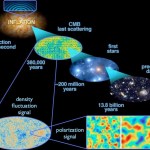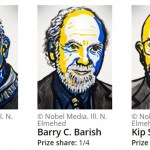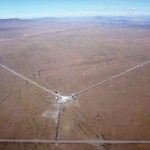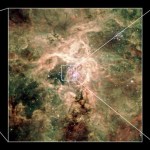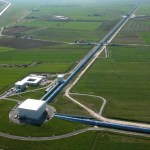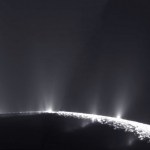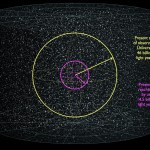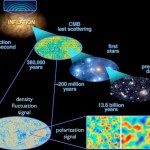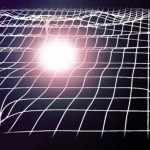"There's no obvious reason to assume that the very same rare properties that allow for our existence would also provide the best overall setting to make discoveries about the world around us. We don't think this is merely coincidental." -Guillermo Gonzalez
Beginning in 1979, a new idea arose in theoretical physics, seeking to improve upon the idea of the Big Bang: cosmic inflation. Recently, a number of physicists, including one of inflation’s cofounders, Paul Steinhardt, have come out with vitriol against the theory of inflation, calling it not even science. It’s true that inflation may not…
Physical Sciences
"Wormholes are a gravitational phenomena. Or imaginary gravitational phenomena, as the case may be." -Jonathan Nolan
Yes, we detected gravitational waves, directly, for the first time! Just days after Advanced LIGO first turned on, a signal of a 36 solar mass black hole merging with a 29 solar mass black hole gave us our first robust, direct detection of these long-sought waves, changing astronomy forever. Einstein’s General Relativity was validated in a whole new way, and over 40 years of work on developing and building LIGO was vindicated at last.
The inspiral and merger of the first pair…
"Well, I walked into Building 20 and looked in at the various little labs. There was a bunch of people doing something that looked to me to be sort of interesting, and since I knew all this electronics, I asked them, “Look, can you use a guy?” And I sold myself off as a technician for about two years." -Rai Weiss, on the start of his physics career at MIT
It’s official at long last: the 2017 Nobel Prize in Physics has been awarded to three individuals most responsible for the development and eventual direct detection of gravitational waves. Congratulations to Rainer Weiss, Kip Thorne, and…
"Suddenly whole new programs open up, things you can do that you could never do before. It'd be great scientifically, it'd be great for the nation, for educators, for students, and it'd be just great for the public at large." -Garth Illingworth
Looking farther and farther into the distant Universe is the equivalent of looking farther and farther back in time. Although Hubble has shown us galaxies from when the Universe is just 400 million years old, and satellites to measure the Cosmic Microwave Background can show us a snapshot at 380,000 years, we have no information about what’s in between…
"I know of no other scientist, no other theoretical physicist alive who has a clearer focus on whether our theories and ideas are relevant to the real world. And that's always what he's after." -Neil Turok, on Paul Steinhardt
The inflationary Universe is one of the most revolutionary new ways of looking at the cosmos to come out of the last 40 years of science. Instead of going all the way back to a singularity from which time, space, matter, and energy all emerged, cosmic inflation posits a different state that gave rise to our hot, dense, matter-and-radiation-filled Universe. With energy…
"Einstein's gravitational theory, which is said to be the greatest single achievement of theoretical physics, resulted in beautiful relations connecting gravitational phenomena with the geometry of space; this was an exciting idea." -Richard Feynman
For over a century after the publication of General Relativity, it was uncertain whether gravitational waves were real or not. It wasn’t until their first direct detection less than two years ago, by the LIGO scientific collaboration, that their existence was spectacularly confirmed. With the VIRGO detector in Italy coming online this year to…
"The surface of the Earth is the shore of the cosmic ocean. On this shore we’ve learned most of what we know. Recently, we’ve waded a little way out, maybe ankle-deep, and the water seems inviting. Some part of our being knows this is where we came from. We long to return." -Carl Sagan
Here on Earth, we hear every so often about a conspiracy of how the world will come to an end. The end of the Mayan calendar; Y2K; an encounter with Nibiru; or a biblical prophesy come true are only a small selection of what people “predict” will bring a demise to our world, and soon. Yet even most of the…
"Day after day, day after day,
We stuck, nor breath nor motion;
As idle as a painted ship
Upon a painted ocean.
Water, water, every where,
And all the boards did shrink;
Water, water, every where,
Nor any drop to drink."
- Samuel Taylor Coleridge
Here on Earth, water can easily exist in all three phases of matter: solid, liquid, and gas. The reason for this is simple: Earth has the right range of temperatures and pressures to experience not just the common solid and gas phases, but the liquid water phase, too. In the outer Solar System, worlds like Europa, Enceladus, and Pluto are too far…
“The more clearly we can focus our attention on the wonders and realities of the universe about us, the less taste we shall have for destruction.” -Rachel Carson
The idea that the spatial fabric of the Universe itself is expanding, and that’s what’s behind the observed relationship between redshift and distance has long been controversial, and also long-misunderstood. After all, if more distant objects appear to recede more quickly, couldn’t there be a different explanation, like an explosion that flung many things outward? As it turns out, this isn’t a mere difference in interpretation,…
"Despite its name, the big bang theory is not really a theory of a bang at all. It is really only a theory of the aftermath of a bang." -Alan Guth
Did the Universe begin with the Big Bang? When we discovered the cosmic microwave background, and its properties matched exactly the prediction of the Big Bang theory, it was a watershed moment for cosmology. For the first time, we had uncovered the origins to the entire Universe, having learned where all of this came from at long last. Emerging from a hot, dense, expanding, and cooling state, the matter-and-radiation-filled early Universe gave…
"Hubble often takes images of distant gravitationally lensed galaxies to infer their substructure and to try to learn about early galaxies in general. For LUVOIR, we would have that same resolution for any galaxy! That’s truly revolutionary." -John O'Meara
If you were an observational astronomer, what would your dream telescope look like? It would have to be huge, with an incredible amount of light-gathering power. The quality of the optics would have to be pristine, and higher-precision than anything ever created before. It would have to have multispectral capabilities, extending beyond both…
“There are two problems for our species' survival - nuclear war and environmental catastrophe - and we're hurtling towards them. Knowingly.” ―Noam Chomsky
Well, another week of science has gone by, here at Starts With A Bang! and everywhere else in the world, and while we're down one space mission from the start of the week (Cassini), there are still lots of good things on the horizon! We're just four weeks away from the official release of Treknology, and just a single week away from the new Star Trek series, Discovery, which I'll be officially reviewing. Our Patreon…
ATTP started it by posting on Well below 2 °C: Mitigation strategies for avoiding dangerous to catastrophic climate changes by Yangyang Xua and Veerabhadran Ramanathan. But as you can tell from ATTP's post, the principal question - although he is far too polite to put it so bluntly - is "where's the novelty?"1 All their GHG and temperature scenarios, as they themselves stress, are consistent with IPCC; so there's nothing new there. Neither are the stochastic runs and attempts to assess the probabilities of exceeding various thresholds. Neither, alas, are the attaching of arbitrary labels to…
“There’s something about sitting alone in the dark that reminds you how big the world really is, and how far apart we all are. The stars look like they’re so close, you could reach out and touch them. But you can’t. Sometimes things look a lot closer than they are.” -Kami Garcia
When we consider things like molecules, atoms, or even protons and neutrons, they all have finite, measurable sizes. Yet the fundamental particles that they’re made out of, like quarks, electrons, and gluons, are all inherently points, with no physical size to them at all. Why, then, does every composite particle not…
“The bedrock nature of space and time and the unification of cosmos and quantum are surely among science’s great ‘open frontiers.’ These are parts of the intellectual map where we’re still groping for the truth – where, in the fashion of ancient cartographers, we must still inscribe ‘here be dragons.'” -Martin Rees
Inside the nuclear furnace of the Sun, protons and other atomic nuclei are compressed together into a tiny region of space, where the incredible temperatures and energies try to overcome the repulsive forces of their electric charges. At a maximum temperature of 15 million K, and…
"The physicist is like someone who’s watching people playing chess and, after watching a few games, he may have worked out what the moves in the game are. But understanding the rules is just a trivial preliminary on the long route from being a novice to being a grand master. So even if we understand all the laws of physics, then exploring their consequences in the everyday world where complex structures can exist is a far more daunting task, and that’s an inexhaustible one I'm sure." -Martin Rees
It’s all too easy to take a look at a prediction that’s about something yet unproven and dismiss…
“In the media age, everybody was famous for 15 minutes. In the Wikipedia age, everybody can be an expert in five minutes. Special bonus: You can edit your own entry to make yourself seem even smarter.” ―Stephen Colbert
It's been another fun-and-fact-filled week here at Starts With A Bang! (And did you know I have a wikipedia page? I do! And most of the facts there are even correct!) I'm planning out the next edition of the Starts With A Bang podcast, which should cover the science that the James Webb Space Telescope will reveal starting in just over a year; yes, we're just…
Apparently, Just 90 companies caused two-thirds of man-made global warming emissions? was so popular that it gets a retread. Despite the original being published in 20133, we're now being told that Researchers have for the first time tied a group of the world’s largest fossil fuel companies, including ExxonMobil, and their products to specific increases in greenhouse gases, global warming and sea level rise. A study published Thursday in the journal Climatic Change concludes that since 1880, 90 of the largest carbon producers are responsible for up to 50 percent of global temperature rise,…
“That's a misconception, Lennie. The sky is everywhere, it begins at your feet.” -Jandy Nelson
There are all sorts of explanations that people give for why the sky is blue. Some say that it’s because of the fact that oxygen is a light blue gas. Others contend that the sky reflects the blue ocean, giving it a comparably blue color. Still others place the blame on sunlight itself, alleging that it’s naturally slightly blue in color. All of these science-y sounding explanations, compelling though they might be, are way off the mark. If they were correct, after all, you wouldn’t have reds during…
"The older you get, the more you realize that the way you look is a reflection of how you treat yourself." -Hope Davis
Age may be just a number, but in cosmic terms, there are some rules it’s pretty important to obey. It should be impossible to have a complex creature that’s older than the planets; a rocky planet that predates the stars; or a star that’s older than the Universe itself. With a figure of 13.8 billion years, we’ve arrived at an incredibly accurate estimate for the age of the Universe since the Big Bang from a slew of different sources, and so nothing should be older than that.…
